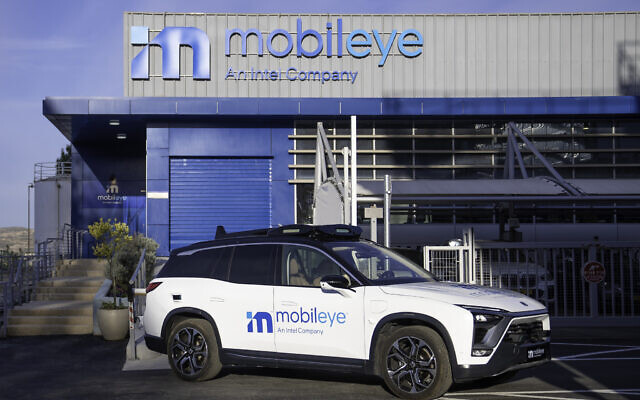Mobileye gets warm Wall Street welcome, raising $861m in long-awaited IPO
Shares for Intel’s Jerusalem autonomous driving subsidiary jump over 30%, at valuation of more than $20 billion
Ricky Ben-David is The Times of Israel’s Tech Israel editor and reporter.

Mobileye, Intel’s Jerusalem-headquartered autonomous driving subsidiary, finally debuted on Wall Street on Wednesday, raising some $860 million in a long-awaited initial public offering (IPO) that valued the Israeli-founded Intel unit at over $21 billion.
Mobileye priced its shares at $21 a piece, $1 higher than the targeted range, and offered 41 million shares, which gave it an estimated valuation of roughly $17 billion. Its shares were up some 30% by mid-session around 6:00 p.m. GMT on the Nasdaq and its market cap surpassed $20 billion in its first day of trading under the MBLY symbol.
Separately, Mobileye said that private equity firm General Atlantic agreed to buy $100 million worth of shares in a private placement in conjunction with the IPO.
In a letter to its customers, Mobileye co-founder and CEO Professor Amnon Shashua hailed “an exciting new chapter” for the company.
“This is not new territory for us. We operated independently before and during our time with Intel – self-funding our R&D and transformation from technology supplier to mobility enabler. And I am confident in our ability to continue growing and thriving as a publicly traded company,” he wrote.
“Under Intel’s ownership over the past five years, we have grown and prospered and are emerging from Intel bigger and stronger.”

Intel bought Mobileye in 2017 for over $15 billion, a transaction that remains the largest exit for an Israeli tech company to date.
The company, which produces adaptive cruise control and lane change assistance technology in driverless cars, as well as driver assistance technology in manually driven cars, was originally expected to be valued at over $50 billion when Intel first announced the intention to take it public last December. While soaring inflation and other adverse market conditions have led to a reevaluation, Mobileye’s showings on Wednesday indicate a warm welcome on Wall Street.
Intel said in December that the IPO move would “unlock the value of Mobileye for Intel shareholders by creating a separate publicly traded company and will build on Mobileye’s successful track record and serve its expanded market.”
“Intel’s acquisition of Mobileye has been a great success,” Intel CEO Pat Gelsinger said at the time.

Shashua said in his letter Wednesday that Mobileye now works with some 50 automakers worldwide and that its systems can now be found in 800 vehicle models, “totaling more than 125 million vehicles equipped with our technology.”
In a statement early Wednesday before the debut, Mobileye said that a significant portion of the net proceeds from the offering will go to Intel “and Mobileye intends to use the remaining net proceeds for working capital and general corporate purposes.”
Founded in 1999, Mobileye went public in 2014 on the New York Stock Exchange before being acquired by Intel.
NOTE: This article was updated to correct that Mobileye listed on the Nasdaq, not the New York Stock Exchange.









